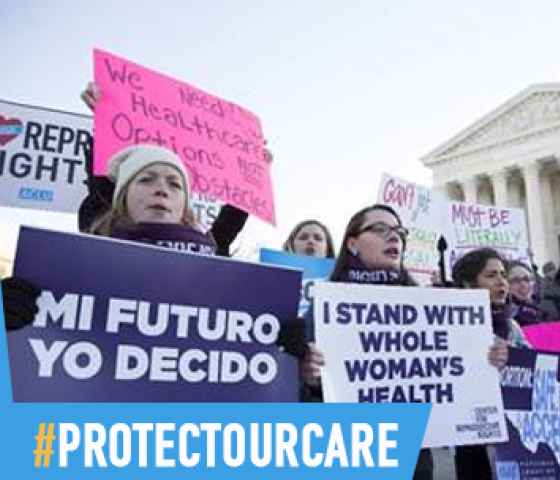The following post was originally published on the ACLU Nationwide website and co-authored by Vania Leveille, senior legislative counsel.
Next week, members of Congress will head home to their districts and states for a weeklong recess. Those brave enough to face their constituents while they are home shouldn't be surprised to find that one of the Republican majority’s top priorities — repealing the Affordable Care Act, also known as Obamacare — is far from popular.
The ACA has played a significant role in ending policies and practices that discriminated against women, LGBT people, people with disabilities, and racial and ethnic minorities. It made health care coverage and access fairer and more equitable, and it has helped preserve the life and liberty of millions of people across the country.
Now, the millions of people who have come to rely on the ACA are making their voices heard at townhall events around the country, urging their representatives not to dismantle this lifesaving law.
Perhaps you’re one of them. Or perhaps you know someone who is. However the law has impacted you, here are just a few of the many reasons to stand up for the ACA:
- The ACA prohibited insurers from charging women more than men simply because they are women, a discriminatory practice known as “gender rating” that was common prior to the ACA. Ending this discrimination has lessened the disparity in coverage rates between women and men. Under the ACA, 9.5 million previously uninsured women gained coverage. And the law guaranteed that their plans would cover maternity and newborn care, which were excluded from most individual plans before the ACA.
- The ACA improved access to Medicaid’s long-term services and supports and expanded the Home and Community Based Services programs. These changes have allowed people with disabilities, who would otherwise languish in nursing homes and psychiatric hospitals, to move into a community where they can work, play, and live, integrated with the rest of society. These services have helped end some of the segregation and institutionalization of people with disabilities that was once rampant and debilitating. Without these services, the right to liberty and autonomy of people with disabilities would be severely undermined.
- The ACA expanded access to a wide range of birth control services by ensuring that they were covered in every health plan without cost-sharing. We know that increased access to birth control is critical to women’s equality, enabling them to pursue education and careers, to plan whether and when to have children, and to lead full, healthy lives. The ACA also made sure that a host of other women’s preventive services — like annual wellness exams, breastfeeding support, and STI testing and counseling — were fully covered by insurance plans.
- The ACA contains the first ever federal civil rights provision prohibiting discrimination on the basis of sex, in addition to race, color, national origin, age, or disability, in certain health programs and activities. This provision, Section 1557, has been especially critical in protecting access to reproductive health services for women and preventing discrimination against LGBT people. And equally important, this provision did not include religious exemptions that would have undermined the very purpose of the nondiscrimination provision.
- The ACA put an end to insurance companies disqualifying millions of people from insurance due to preexisting conditions. Before the ACA became law, insurers could discriminate against a woman who had a cesarean section, breast cancer, pregnancy, and even treatment for domestic violence on the grounds that these constituted preexisting conditions that disqualified her from coverage. Similarly, if an individual had a disability or chronic condition, they could be denied enrollment or specific benefits based on that preexisting condition.
- The ACA also reduced racial and ethnic disparities in health care, closing the gap in coverage between African-American children and white children and significantly reducing the percentage of uninsured African-American and Hispanic women. It has also made major strides in reducing economic inequality in health care, allowing 31 states and D.C. to expand Medicaid coverage to millions of low-income people.
Today, these gains and protections are at risk. And that is unacceptable.
Up to 32 million people could lose coverage as a result of ACA repeal. Discriminatory policies could be reinstated and would almost certainly threaten the care that women, people with disabilities, and LGBT people need to live lives that are healthy and free.
That’s why the ACLU will fight against repeal of the ACA.
Speaker Paul Ryan has said that Republicans will release their ACA repeal bill after next week’s recess. It’s expected that the bill will also defund Planned Parenthood. An entirely separate blog could be written about just how devastating the impact of this would be — but, in short, it would block Medicaid patients from using Planned Parenthood health centers, cutting off their access to preventive care services like breast exams, cancer screenings, STI tests and treatment, and birth control. As a result, Planned Parenthood health centers, which 2.5 million people rely on for care every year, may be forced to close their doors. This would have a disastrous impact on health care access, particularly for women and low-income people, across the country—particularly when combined with the impact of ACA repeal.
We can’t let this happen. If you agree, make sure that your members of Congress hear from you. Next week, they’ll be in the neighborhood.
